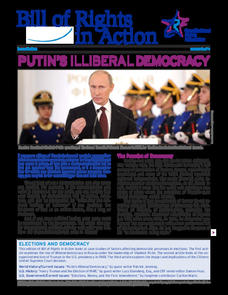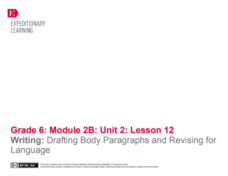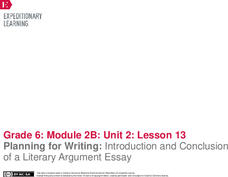Judicial Branch of California
Fayette v. Take Two: The First Amendment
An informative lesson provides scholars the opportunity to study a Supreme Court case regarding the First Amendment and make a ruling with the members of their group. Class members also participate in group discussion and prepare a...
American Museum of Natural History
Journey to the Bottom of the Sea
Follow the path to the sea floor. Pupils play an online interactive board game to reach the bottom of the sea. Participants must match descriptions of creatures to a property of water dealing with oxygen, food, light, or density to move...
American Museum of Natural History
Brain Power
Did you know it's possible to train your brain to work better? Learners use brain games to try to do just that. The games test vision and memory and give them the opportunity to improve their scores. The lesson works as an in-class...
EngageNY
Bringing Douglass’s Words to Life: The Fight with Covey
Readers have the opportunity to bring the words from an excerpt of Narrative of the Life of Frederick
Douglass to life. They use strategies from the Storyteller’s
Toolbox anchor chart as a guide and then work in pairs to prepare their...
EngageNY
Writing an Analysis Essay: Introducing the Writing Prompt and the Model Essay
A model analysis essay provides writers with an opportunity to examine a response to the end-of-unit assessment writing prompt. Scholars define key words in the prompt and discuss how the model essay meets the demands in the prompt....
Teaching Tolerance
Picture Books
Aspiring artists and budding writers combine their skills in an interactive lesson. Young scholars become authors when they create their own picture books focused on social justice. The resource guides learners through the writing and...
Constitutional Rights Foundation
Global Warming and the Paris Agreement
Global warming: a political debate or a scientific fact? Young historians read text, complete activities, and participate in group discussion to understand the political debate surrounding global warming and the US decision to withdraw...
Constitutional Rights Foundation
Putin's Illiberal Democracy
Is Russia really a democracy? High school scholars explore Russian democracy under the leadership of President Putin. The resource provides opportunity for group discussion, writing, and research to understand Russia's political history,...
EngageNY
End of Unit 2 Assessment, Parts 1A and 1B: Fishbowl on Screen Time and Adolescents
Here's a surefire way to ensure that class discussions go swimmingly! Using the resource, scholars participate in a Fishbowl activity, forming two concentric circles in the classroom. As the group on the inside of the fishbowl discusses...
Just Health Action
What Makes a Community Healthy?
Young people have an opportunity to make it a beautiful day in their neighborhoods with an activity that asks them to identify what is healthy and unhealthy in their community and develop some ideas about what they can do to fix the...
Missouri Department of Elementary
To Give In or Not to Give In—That Is the Question!
No! A very simple word that can be very hard to say. Seventh graders have an opportunity to practice this difficult skill as they engage in a series of role-playing scenarios. As an exit ticket, 7th graders write a reflection on the...
American Museum of Natural History
The Legend of the Flying Frog
Young conservation biologists have an opportunity to get involved in the effort to save endangered species. After reading and illustrating the tale of the Flying Frog, they craft a tale about another fictional endangered species.
American Museum of Natural History
Mint Your Own Coin
Provide young archaeologists with an opportunity to craft their own artifacts. The step-by-step directions in an engaging resource show them how to mint their own coin, complete with image, date, and motto.
American Museum of Natural History
Dress Up a Horse
Walk, trot, gallop! Young equestrians have an opportunity to learn all about horses with an engaging resource that lets them select tack to dress up a horse, create flip books that illustrate the various gates, have questions answered by...
National Endowment for the Humanities
A Defense of the Electoral College
Each presidential election year, the debate about the electoral college rages. Michael C. Maibach's "A Defense of the Electoral College" offers young political scientists an opportunity to examine a reasoned argument for why the...
National Woman's History Museum
Country to City
After reading a series of primary source documents, groups compare the lives of and opportunities available to rural and urban women in the 19th century to rural and urban life in the 21st century. As an exit ticket, individuals craft a...
Nemours KidsHealth
Safe and Healthy Summer: Grades 6-8
The pull to sloth can be strong in the summer. The couch and the beach beckon, but the lazy days also provide the opportunity to practice healthy habits. Two activities urge tweens to try something new. First, they research healthy items...
Teaching Tolerance
Jim Crow as a Form of Racialized Social Control
Just because slavery was illegal doesn't mean it went away ... Jim Crow Laws took its place. An eye-opening lesson focuses on how Jim Crow Laws were used as a form of racial social control against African Americans in the United States....
Teaching Tolerance
Modern-Day Heroes: People Who Are Making a Difference
Not all superheroes wear capes. An engaging lesson delves into the world of modern-day heroes and activists for change. Academics learn there are many different ways to be a hero as well as explore what makes a person a hero. The...
Teaching Tolerance
In Our Own Words: A Story Book with a Purpose
Academics turn into storytellers in an engaging activity on activism. The activity focuses on promoting social change in local communities with stories. Young historians plan a storybook to target a specific audience and social issue and...
EngageNY
End of Unit Assessment: Final Essay
This is just the transition phase. Scholars participate in a mini lesson about using transitions in writing. They then have a brief peer critique of the introduction and conclusion paragraphs for their end of unit assessment. Learners...
EngageNY
Writing: Drafting Body Paragraphs and Revising for Language
This is a formal affair. Scholars take a look at using formal writing in essays. They analyze the model essay Are We Medieval?: Opportunities in the Middle Ages and Today? They then begin working on the first draft of their own essays.
Minnesota Department of Natural Resoures
Minnesota’s Forests
The forests of Minnesota provide middle schoolers with an integrated learning opportunity. They examine the three biomes and their histories, conduct experiments, read stories, and draw pictures. A lovely lesson plan about trees.
EngageNY
Planning for Writing: Introduction and Conclusion of a Literary Argument Essay
Give a powerful introduction. Scholars analyze the introductory paragraph in the model essay "Are We Medieval?: Opportunities in the Middle Ages and Today." They discuss the key components the author includes and then walk through the...
Other popular searches
- Job Opportunities
- +Teaching +Opportunities
- Employment Opportunities
- Education Opportunities
- Job Opportunities Lesson
- Job Opportunities in Spain
- Entrepreneurial Opportunities
- Economic Opportunities
- Equal Opportunities
- Computer Job Opportunities
- Teacher Job Opportunities
- Business Opportunities in Asia

























